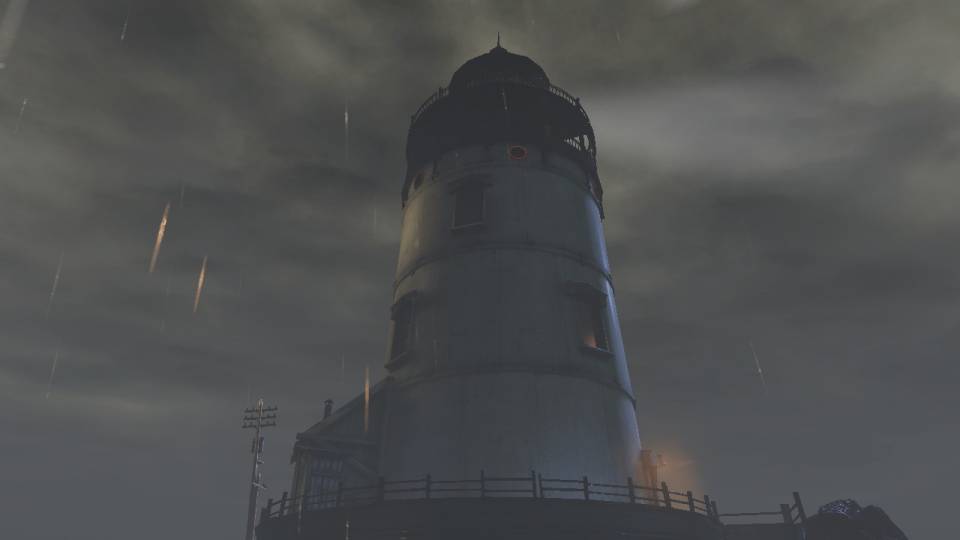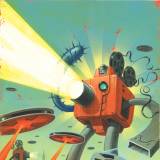It's All Been Done Before: Bioshock's Infinity
By Daneian 28 Comments

NOTE: Franchise Spoilers
Two lighthouses stand tall. In both Bioshock and Bioshock Infinite, walking through their front doors is the first step in your adventure in two cities that share more in common than their architecture would lead you to believe. In Bioshock proper, the door leads to a bathysphere that takes you to the cold blackness of the underwater city of Rapture, deep below the sea. In Infinite, it contains the rocket that will launch you to the sun washed floating city of Columbia, high above the clouds. You only need to play the first five minutes of both these games to observe the duality at their heart- one is a descent into Hell, the other the ascension to Heaven.
1960. Rapture lies in ruin. When Jack’s bathysphere docks, the shattered lights, the broken walls and the streaks of blood all tell us that something very bad has happened here. Much of the game has us scavenging among the wreckage for whatever goods we can use to help us survive, rooting through ransacked shops and looting their dead patrons. Over the course of the game, we learn the history of a place that was once much grander, a city whose culture, politics and people were twisted and disfigured until the people turned on each other in a violent rebellion. As much as Rapture feels like it was once a place, it was also a character.
It’s ironic watching two titans fighting over the burned out husk of the city. The war between founder Andrew Ryan and the conman masquerading as social reformist Frank Fontaine had destroyed Rapture and left them in a tenuous cold war with a pile of rubble at stake. When Jack gets there, he is ushered along by the disembodied voice of Atlus, a man who guides you through the halls and to Andrew Ryan’s office with three simple words and a question mark. ‘Would you kindly?’
Those words would come to carry a great deal of weight. When Jack finally meets Ryan in person, the capitalist says ‘A man chooses. A slave obeys.’ When Jack bashes Ryan’s brains out with his own golf club because he’s been programmed to follow the orders accompanied by ‘Would you kindly’, you realize that just as he didn’t have any control over his task, you didn’t have true freedom over the actions that led you to that moment. You could have used different weapons to kill your enemies or discover some areas of the city and not others, but the only choice you make that affects the outcome of the main plot is the decision to play, or not to play. The nightmare at Rapture was a means to analyze the nature of freedom and agency expressed through the unique abilities of videogames. Until that moment, both Fontaine as Atlus and the designers had manipulated you from objective to objective. A man chooses. A slave obeys.
1912. Columbia is alive and friendly. When Booker’s rocket lands, we find a bright day casting light over beautiful, clean streets. He’d been sent there to retrieve a mark- a young woman named Elizabeth. The shops are full and the people are happily listening along to barber shop quartets as a parade floats by. It seems perfect. But when you go to the raffle and discover that the prize is the right to throw the first pitch at an interracial couple who had the audacity to fall in love, you get see that below the smiles and sunshine is something sinister.
Elizabeth is caged in a large tower within the city, the mythical princess to Columbia’s prophetic leader Zachary Hale Comstock. As he makes his way to her, Booker discovers the truth about Columbia- under the pleasant surface is a city built on oppression and socially sanctioned racism. An underground resistance has formed calling themselves the Vox Populi led by the freedom fighter Daisy Fitzroy who is tired of the unfair treatment and unequal justice. When he gets to the tower, Booker finds that Elizabeth possesses strange powers that let her open tears in the fabric of reality and move objects through.
Getting out of the city requires that Booker aid Fitzroy in arming her people. With Elizabeth’s powers, he jumps into new dimensions, places that are similar to his but with a few key differences, and procures a vast weapons cache that finally lets the Peoples Voice be heard. The uprising begun, the population is locked in a civil war, the two general’s armies clashing in the streets. When Columbia lies in ruin, you realize that this is how Rapture had fallen and that you’ve initiated a line of events in Infinite that you had only discovered after they’d happened in Bioshock. Soon after you beat Comstock’s head in and drowned him in his holy water, Elizabeth opens one last tear. And you find yourself in the halls of Rapture.
This is the defining moment in Bioshock. We learn that the series takes place over a million million separate realities, places that seem similar to ours but have minute differences. An ocean of lighthouses with the same constants but different variables. Of course, if Bioshock was an examination on choice, Infinite says that everyone believes that they’re making the right choices, even if it’s the difference between being the story’s hero and being its villain. Because every choice that can be made, has already been made. Every bullet you shot, every bullet you took was one possible outcome in a chain of events that led you to that moment. The only way to break the chain is to remove one of its links.
At the same time, the revelation that Bioshock and Infinite are intrinsically the same story could be a tacit admission that it’s themes have been regularly used by the medium in one form or another since Super Mario Bros. Look at the relationships between the heroes and villains of the Legend of Zelda, Metal Gear Solid and Halo- the characters are different, but the quest has largely stayed the same. There are constants and there are variables.
That’s interesting considering its part of an industry built on franchise IP, content to crank out sequels rather than develop new ideas once they’ve found a workable blueprint to exploit. It’s even more interesting when you consider that Bioshock was a victim of this same trend when its publisher made a sequel that was considered-perhaps unfairly-an unnecessary attempt to cash in on the originals success. Maybe that’s another reason why Bioshock Infinite doesn’t have a number at the end- it’s claiming ownership over every entry that has been and will be and preemptively calling out any sequel that tries to tell its story again. Maybe Infinite is a challenge to the medium: do something new rather than recycle the same thing over and over.
Really, it’s on the cycle of human history that Bioshock’s lighthouse focuses its spotlight. The uprisings that took place on Rapture and Columbia are similar to the real life Boxer Rebellion or The Wounded Knee Massacre that you’ll find in Infinites ‘Hall of Heroes’ war memorial- it’s only the skin color under the uniform that has changed. With them, Bioshock has asked a question. If throughout human history, we keep reliving the same tales of social reform over and over, when are we going to wise up and stop? Thankfully, it’s given us a way to answer that question in the compounding resolution of its two stories: we have the power to decide our actions and change our world, we just need to know where in our story to make the right choices.

29 Comments